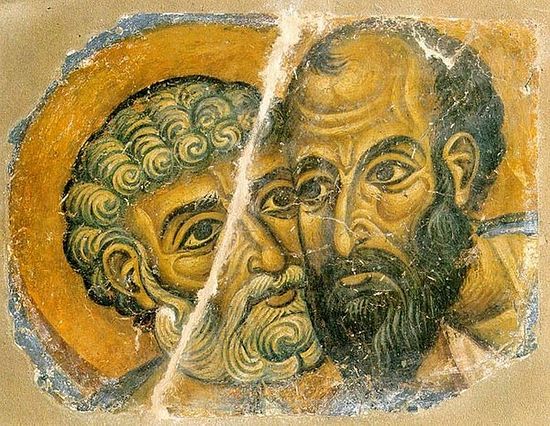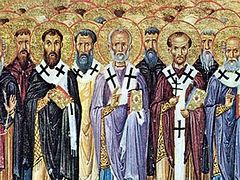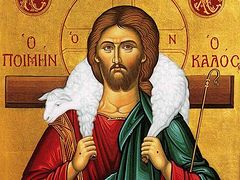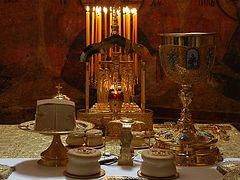The following contemplation on the apostolic conciliarity of our Church was written by Archimandrite Gregorios (Estephan), Abbot of the Dormition of the Theotokos Monastery, Bkeftine, Lebanon.
On the feast of Sts. Peter and Paul, and all other apostles, the Church celebrates an important stage in its holy life.
The apostle in Christianity is the one who is entrusted by God to a Divine ministry or mission. For the Lord chose His apostles, He loved and taught them, and He was a model for them in everything, in order for them to become God-bearers, able to make disciples of all nations, to baptize them and to bring them to the love of His Commandments. God entrusted to them the mystery of man’s salvation, the dogma of God’s Heavenly Kingdom; He gave them the authority of binding and loosing, of healing diseases and casting out demons, of celebrating Divine Mysteries, and of elevating successors for themselves: Wherefore I put thee in remembrance that thou stir up the gift of God, which is in thee by the putting on of my hands (2 Tim. 1:6).
It was natural for the apostolic gift that our Lord Jesus Christ founded to persist after the death of the apostles. It was transferred to their successors whom they themselves chose. This is clear in the epistles of the New Testament that spoke of elders, bishops and shepherds, and the early Church deeply understood this truth. St. Clement the bishop of Rome says clearly, in his epistle to the Corinthians at the end of the first century, how the Apostles made successors for themselves to lead the Church. Bishops in Orthodoxy are direct successors of the apostles; they are the apostolic succession that our Lord chose to lead the world through them to the unique Truth. This is the meaning of what the Lord Jesus told them: Lo, I am with you always, even to the end of the age (Mt. 28:20).
He is with them through the bishops, their successors. These bishops became not only apostles for Christ, but also prophets of the New Testament. For after the work of prophecy ceased as a special gift in the Church, by the beginning of the second century A.D., the bishops of the New Testament received the work of prophecy along with the work of apostleship. They are apostles who preach Jesus Christ, and their role as prophets is to proclaim His will to the Church and God’s people. Thus, the Church, whose head is the Lord Jesus Christ, is built on the foundation of the apostles and prophets, Jesus Christ Himself being the chief corner stone (Eph. 2:20). And these gifts are transferred to the priests, bishops’ assistants, through the obedience of these priests to the bishops, when this obedience does not conflict with the Church’s faith, Tradition and canons.
Conciliarity and consultation were the attributes of the early apostolic Church. The apostles led the Church through councils. The apostle Paul did not act by his own individual will and his own decisions, but he says that he went up to Jerusalem to communicate his Gospel to those who were of reputation, lest by any means he might run, or had run, in vain (Gal. 2:2). The Apostolic council of Jerusalem achieved the fullness of the Church’s conciliar image, and revealed that conciliarity as part of the Church’s nature. Therefore, the Church used to hold its councils in the model of this council, and struggles to preserve the spirit of conciliarity in its midst.
After the Apostolic period, councils continued to make up the canonical configuration that expresses the assembly of the whole Church. Thus, local and ecumenical councils were held, where the assembled bishops represent the people of God and they are entrusted to them. This conciliar spirit is reflected in the whole of the Church’s life, even in the faith of the Church. For the conciliar spirit is what makes Church life grow in a free and charismatic manner, not controlled by fear of the rule of the head who has exclusive possession of authority, who himself is usually ruled by many passions, and is not able to accept those who oppose his way and approach.
The holy dogmas were identified through this conciliar and charismatic spirit; Church theology grew in a direct, Orthodox manner, and the Church’s liturgical life grew in a spiritual ascetic manner. And with this spirit, canons were established, not to scare the faithful, but to preserve their journey from the weakness of nature, and facilitate its way to the Kingdom. No freedom exists outside conciliarity, and no charismatic theology exists outside conciliarity, because otherwise the movement of grace is transformed to an institutional worldly spirit to serve the ruling head, out of fear or flattery. In real conciliarity, the One Spirit works through the many gifts to build the one body of Christ; and this Spirit cannot work outside conciliar life. This is why Christ said, for where two or three are gathered together in My name, I am there in the midst of them (Mt. 18:20).
Every aspect of Orthodox Church life is conciliar, from the parish to the ecumenical council. And everyone who participates in fueling individualistic dominance in priests or bishops (or patriarchs at the local Church level) constitutes a real danger to the Holy Spirit’s whole journey in the holy Church, and disrupts His gifts in the faithful. The dominance of the bishop in the Church is a sign of the spirit of pride, abominable egotism and the passion of vainglory ruling in his soul. Christ taught his apostles first and foremost the virtue of self-denial, when they were competing over the first places, saying, The rulers of the Gentiles lord it over them, and those who are great exercise authority over them. Yet it shall not be so among you (Mt. 20:25-26). For if this type of rule is within us, what then makes us different than the rulers of the Gentiles that Christ condemned? Does not the Church then become an institution among the nations of this world, and its bishops become worldly rulers similar to current world leaders?
These are the factors that caused the fall of the church in the west and its transformation into a real papist church, when the church was entirely reduced to the person of the pope and he was made above the councils, abolishing the ecclesiological principle that the Church followed for one thousand years. The pope became the church, and when he fell in terms of the faith, the church heads fell along with him, and ended up outside the body of Christ. Therefore, no Church exists in the absence of conciliarity.
In Orthodoxy, local councils have the primary practical role of standing up against contemporary ongoing challenges. The local council of bishops works in the same spirit as the holy ecumenical councils, preserving the Orthodoxy of their dogmas and canons from perverted teachings and false theology. The ecumenical councils are of high authority in the Orthodox Church and a local council cannot break any of their teachings or canons. It only can use dispensation when necessary. The other role of the local council is to teach the faith to the people of God, and how to live it in a spirit of repentance, confession and participation in the Divine Mysteries, and how to resist the spirit of secularism that is spreading in Church life to destroy the spirit of godliness in it.
The Church lives this conciliarity in every Eucharistic gathering; it draws the foundation for its conciliarity from these Eucharistic gatherings. It is there where the confession of the one Orthodox faith takes place, where the Lord is present with the faithful around Him along with their bishop, that constitutes, by the power of the Holy Spirit, a Eucharistic council that manifests all the ecumenical dimensions of the one Church’s conciliarity.





